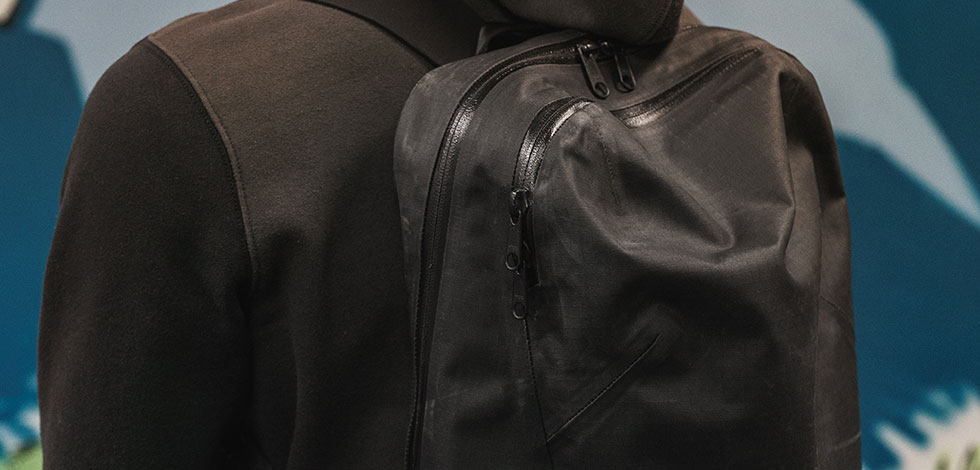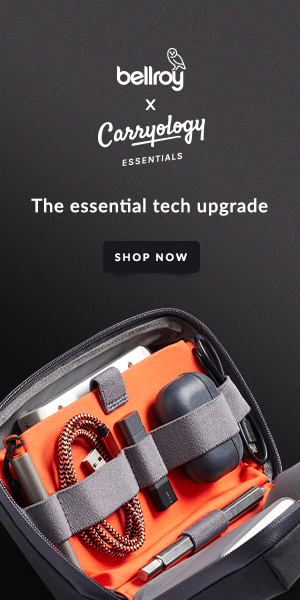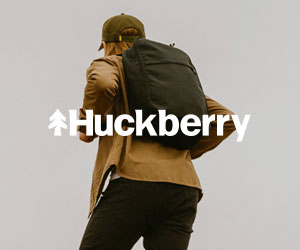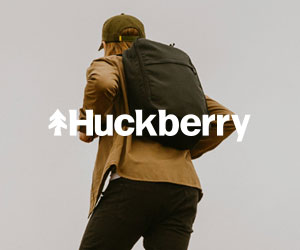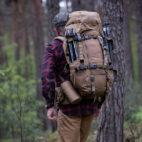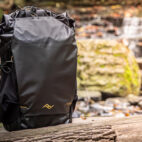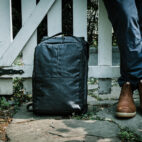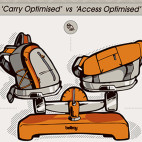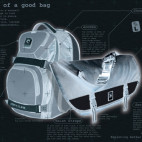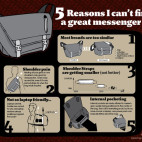2 Years with the Arc’teryx Veilance Nomin 1.0
I’ve spent nearly two years with an Arc’teryx Veilance Nomin, and I’m finally ready to review their eye-wateringly high-end daypack. I also sat down with Taka Kasuga, Design Director at Veilance, to chat about the bag.
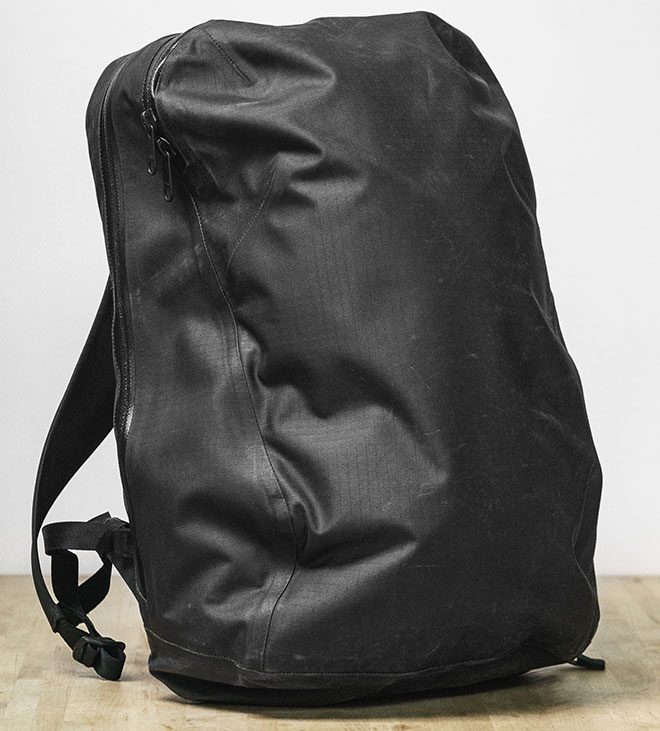
I didn’t want to like this bag. When I got it I was feeling ready for a bit of a takedown on something unnecessarily expensive.
Most reviews of ultra-expensive products follow a familiar formula: gush over the features and design, acknowledge the price, and set out conditions for when the product is justified. I’m guilty of it, as is anyone else who has ever reviewed anything nice. As a result, I was feeling ready for a takedown on something expensive and unnecessary. I kind of didn’t want to like this bag.
Unfortunately, the Nomin is amazing. The only thing that will pry it from my cold dead hands is a future version of the same thing. Mine. Gimme. Justifying it over an Eastpak is as fruitless as justifying a LaFerrari over a Civic.
Details
Price: $650.00 USD* (*the price has jumped around a bit in the last year.)
Materials:
– AC² plain weave nylon urethane laminate
– Water-resistant, 100% nylon face
– Taped seams
– WaterTight™ external zippers
– Fidlock™ Snaps
Manufacturing: Made in Canada
Features:
– Front compartment with internal organization pocket and key hook
– Rear compartment with removable rigid laptop and document divider with bungee cord and snap closure
– Low profile, laminated shoulder straps
– Integrated new top and side carry handles
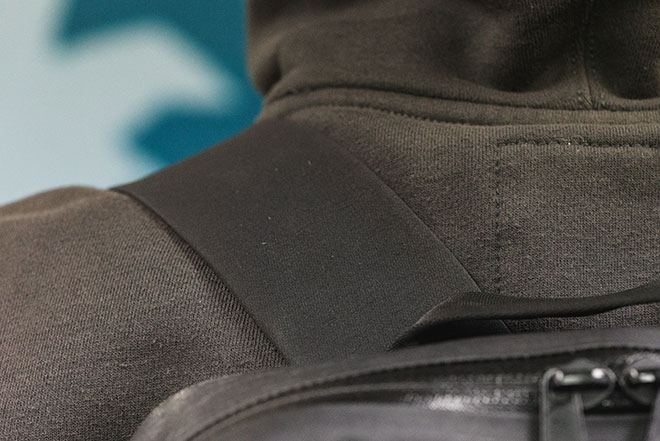
Fit
One of the first things I noticed about the Nomin when I first picked it up is that the shoulder straps feel, well, different. They’re incredibly pliable and supple, soft with no padding or bulk at all. It made sense the moment I shouldered the pack.
Last year the Arc’teryx crew did a Reddit AMA. I asked about how they made the Nomin shoulder straps so comfortable, and the reply was “25 years of building climbing harnesses.” I guess it makes sense that if you can make a climbing harness comfortable, an urban daypack should be child’s play.
Whether it’s strap shape, materials, or their experience with harnesses, the pack is comfortable to wear. Even with a laptop, charger, magazines, files, camera, jacket, and a pound of coffee in there.
Another striking thing about the Nomin is how well it seems to fit a variety of people. It sits as naturally on my 5’1″ wife as it does on a friend of mine who is 6’2″ and pushing 240 lbs. More climbing harness experience?
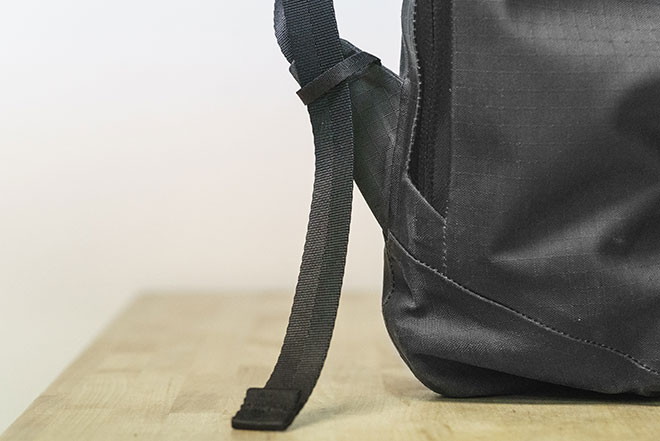
In terms of adjustments, the Nomin has a novel little loop of material that holds the silky grosgrain strap adjusters to the body of the pack. This keeps things tidy, with nothing dangling off the front pack, while also keeping strap adjustments close at hand. Having unequal strap length bothers me more than it should, and this system makes it easy to keep everything just right.
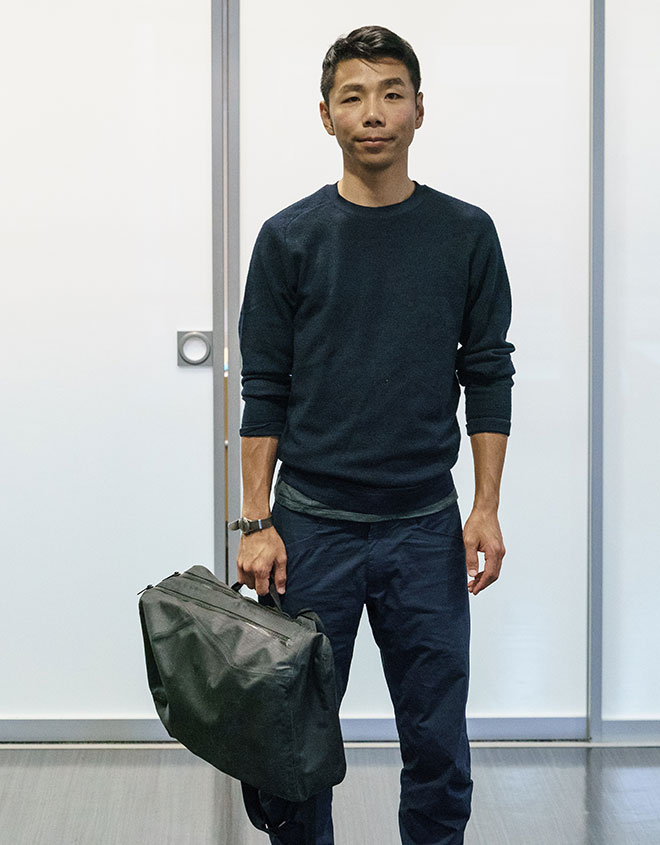
Taka Kasuga, Veilance Design Director
Fashion
Let’s be honest for a moment and admit that we all buy products to represent us. Even the choice of not buying products to represent ourselves is an attempt to refine our personal brands. In my opinion, the Nomin looks awesome. It’s part stealth fighter, part panther, part insect, part future android hybrid.
It’s fully murdered out—all black, no logos, but distinctive. I was stopped in the street in Taichung by a young guy who recognized the bag and wanted to check it out. There was a bit of a language barrier, but he definitely told me I was “going to get all the b****es, for real man.”
Veilance was ahead of the curve on the pendulum swing from craft to tech, but the Nomin is as unobtrusive as you want it to be. The silhouette is refined and minimal, a far cry from the bulky roll-top bags you see at every LA coffee spot.
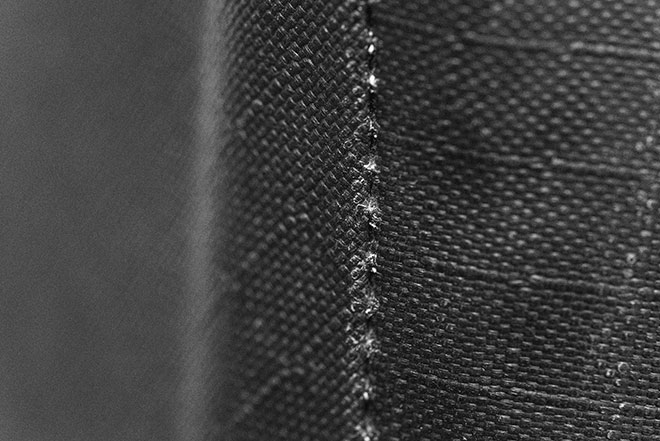
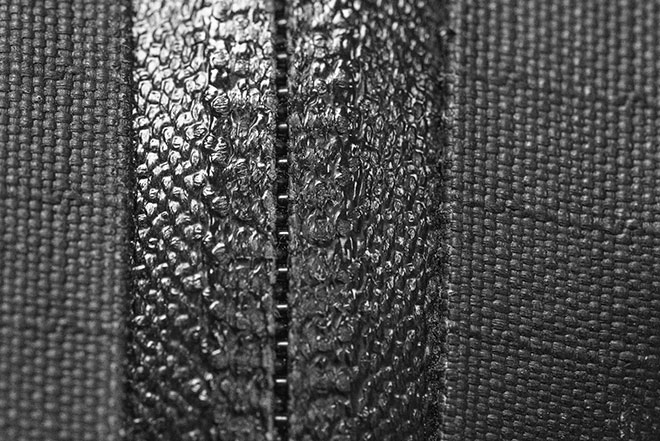
One of my favorite things about craft materials like leather and canvas are how they wear in comparison to many outdoor textiles. Shitty old canvas has patina, but shitty old Gore-Tex is kind of sad. That’s not the case with the Nomin’s AC² fabric; I’ve beaten it to hell over the last few years and if anything the bag has only gotten more character. The little scuffs and marks on it feel like they have stories, without making the bag look imperfect or ruined.
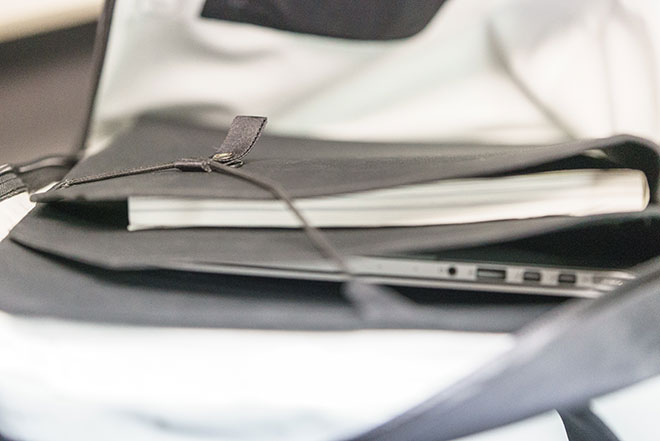
It’s also worth a quick note that this bag is handmade in a high-tech facility a few minutes outside Vancouver, Canada. I was sworn to secrecy when I toured the place, so I can’t give up many details now, but seeing the technology and craftsmanship that goes into building these bags is amazing. In contrast to a lot of the other items that Arc’teryx manufactures in that facility, the Veilance line is almost exclusively done as individual pieces rather than on an assembly line. I’m hoping to give you guys more of a peek behind the curtain there soon!
Function
To afford the Nomin you need a job (or a trust fund), so it stands to reason that it should be a functional work bag. It has a two-partition, removable laptop/file sleeve in the main compartment. The sleeve actually elevates your laptop off the bottom of the bag, acting as a sort of suspension system and allowing me to just dump my MacBook in there without a second thought. It’s the little things.
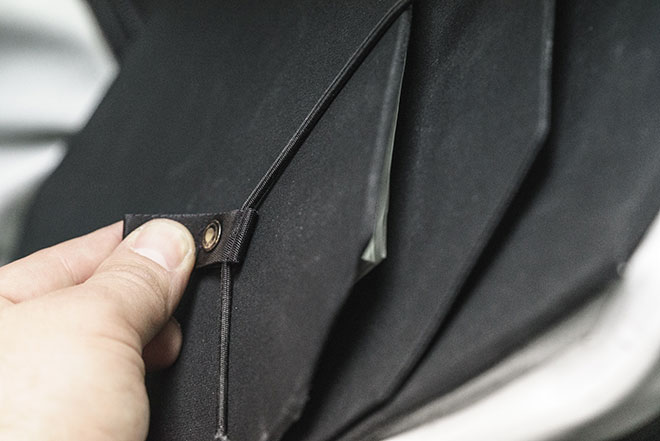
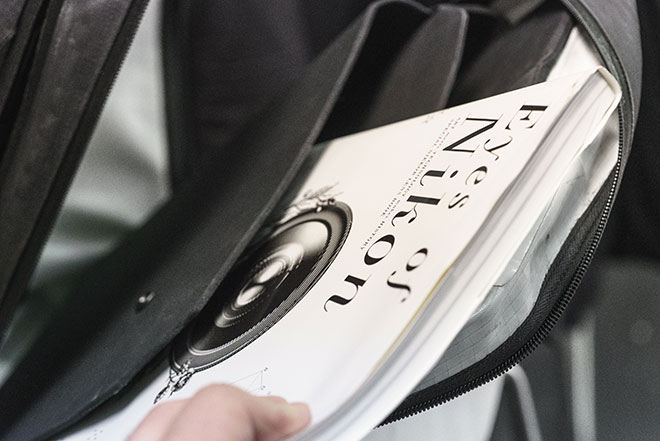
File organization with the Nomin is excellent, and loose papers stay nicely protected. Throw some reading material in the second sleeve partition, hold it all together with a Fidlock Snap bungee system, and it’s a tidy package. The Fidlock Snaps come with big warnings and use instructions, but I found them fairly intuitive.
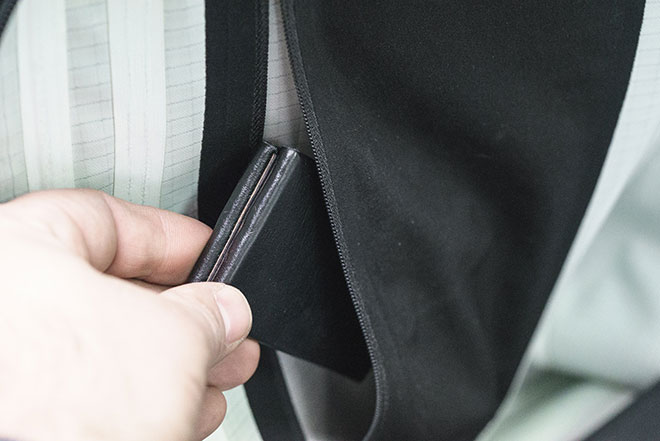
The rest of the main compartment isn’t roomy, but has enough space to be functional. It also has an awesome discreet pocket made of some stretchy, neoprene-like material. I carried an engagement ring around France in that compartment for two weeks last year. I’ve never been more paranoid about losing a bag.
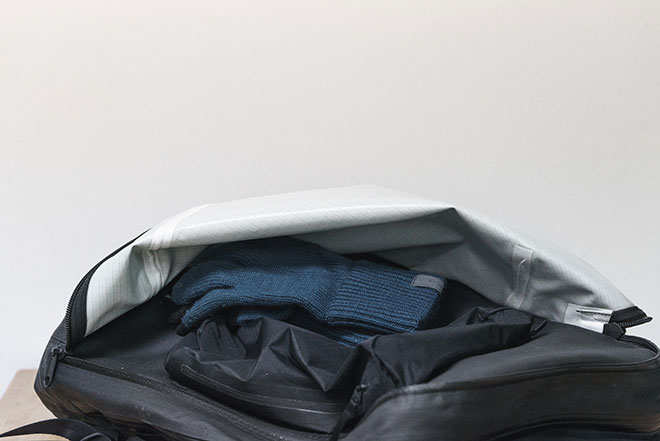
The shallow front compartment is odd at first glance. I find this compartment less useful than the main one, but since it’s separated from the main compartment by a waterproof AC² layer it’s nice for keeping things like sunscreen or bug spray away from computers and files. The contoured shape of the front compartment is also what helps the bag stay unobtrusive; it doesn’t catch on things and it’s easy to wear in a crowd without feeling like a jerk.
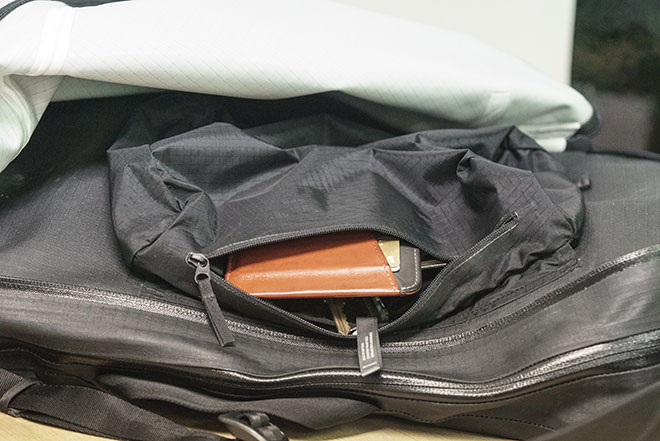
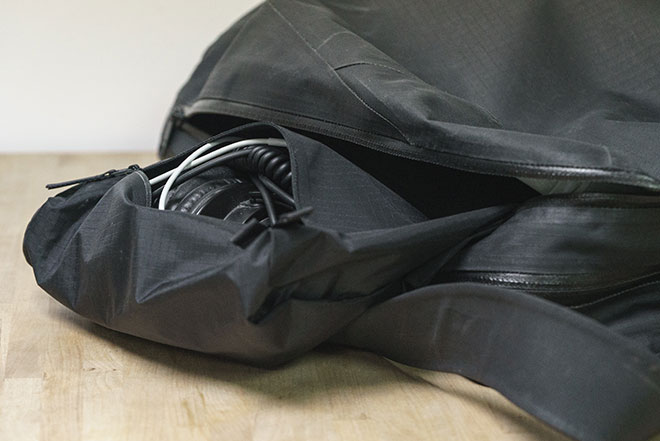
Much of the front compartment volume is taken up by a floating ripstop bag that flips out sideways and is accessible from either side. It took some getting used to, but I like the ability to keep odds and ends from settling into the bottom of the bag—once you unclip the snap and flip the pocket out of the bag, access is fast and organized.
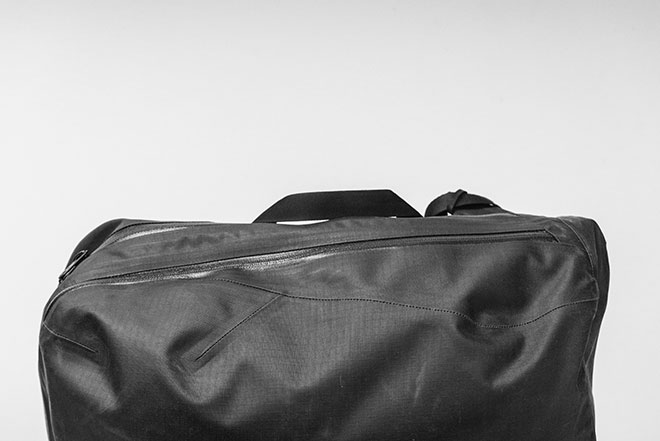
The bag’s touch-points are perfect. The webbing for the handles is silky smooth, and everything feels incredibly solid. Having the option to carry it by a side handle is really nice. Turns out there are still boardrooms where it’s not okay to wear a backpack.
One big surprise for me is how the bag is up for anything. Being bombproof, low profile, and waterproof (they say “resistant,” but that’s overdoing cautious wording), I find myself bringing it everywhere. From poorly planned day hikes, to grimy road trips, to rainy bike commutes, to business travel, to being tossed in the heli because I was one bag short for our gear, it stood up to whatever came my way. It may be a fashion bag, but it’s ready for absolutely anything.
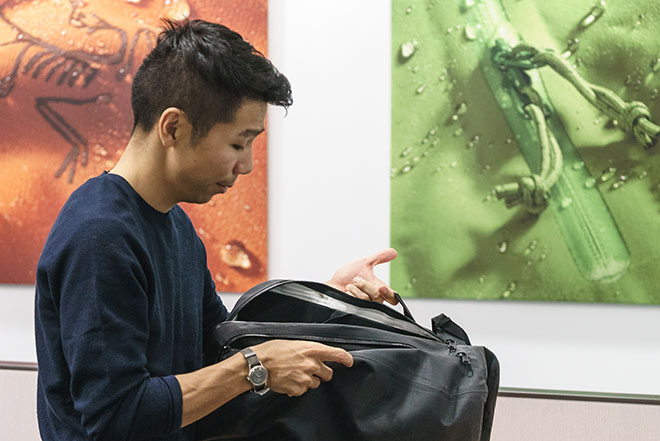
Q&A with Taka Kasuga — Veilance Design Director
I swung by Arc’teryx’s North Vancouver Design Headquarters to speak with Taka Kasuga, the Design Director at Veilance. He’s a gregarious, fascinating guy, with lots to say on carry.
What is Veilance all about? How separated is Veilance from the rest of Arc’teryx?
Veilance was launched in 2009, aimed at taking the pinnacle of outdoor technology and applying it to an urban environment. Its goal is to create a system that advances how people live in the urban environment.
Functionally it’s not separated at all from Arc’teryx—we’re in the same building, and relying on the same core competencies that make Arc’teryx so successful. But conceptually it’s a well-defined shift. Veilance allows us to take a minimalist aesthetic even further, and apply it to the cultural relevancy that’s a norm in those urban settings.
Does greater history inhibit or free up innovating on new techniques? Are the Veilance team fresher and newer than others in the company? Or drawn from the more experienced ranks of the Arc’teryx team?
I’d say neither, and both. We have a great mix of experience and creativity, and we’re fortunate to have the most innovative pattern maker in our team. There is also a lot of crossover and collaboration with the outdoor team—we have the ability to share construction methods, materials, ideas, and tooling.
I’ve heard it took five years to design the Nomin. Why so long? How long do most projects take from kick-off to first unit sold?
I don’t think that’s actually the case. I wasn’t at Arc’teryx when development began so I’d have to double-check, but generally a bag design takes approximately three years to bring to market.
What is AC²? Is the material on the Nomin the same as on your more moderately priced Arc’teryx bags?
AC² is a tough, nylon fabric with a urethane laminate. It allows us to use a variety of textile fusing and construction techniques. The fabric on the Nomin is the most advanced type of AC² material we use, and not the same fabric as in the rest of our bags like the Granville or Alpha FL. It’s made in the USA, the face fabric is different, and both the interior and exterior coatings are different. [Ed. Note: the Nomin I’ve been testing has a ripstop face fabric, but they’ve since switched to a plain weave face fabric that looks even sleeker and Taka says is plenty strong]
What did the product brief look like for the Nomin? Was it a shared vision that evolved during the design process? Were there commercial concerns, or was it more of a singular creative vision that ignored constraints?
The goal with the Nomin was to bring the performance and functionality of our outdoor gear to a more urban-focused bag. Its silhouette needed to be instantly recognizable as Veilance.
Commercial relevance is a consideration, but a bag like the Nomin starts from personal passion. Lots of people like me grew up with backpacks and sneakers, regular streetwear, and they’re professionals now who want quality things. But, they don’t associate with “heritage” products and they don’t necessarily want a briefcase.
Leather and other traditional textiles don’t have the same performance as high-end outdoor materials, especially in harsh or wet climates, so that’s always a key part of what we are trying to accomplish. It’s a detail-oriented, weather-resistant, aesthetically minimal backpack that works in both professional and casual settings.
Where does the pack sell best? What cities around the world most inspire Veilance?
It’s always hard to gauge demand of a product that you produce in limited quantities. That being said, Japan absolutely loves this pack. We definitely get the most feedback from there. And of course people in Vancouver like it, since we get so much rain.
Inspiration-wise, it’s urban centres all over the world. I lived in New York for a long time, and Japan before that, so a lot of my own design cues are informed by that history.
Arc’teryx staff are known for pushing it outdoors. How does the Veilance team push their own performance and understanding when it’s based around more of an urban lifestyle?
There are a lot of technologies being developed for outdoor applications that can be adapted to other environments. We get the best of both worlds, running our fabrics and innovations through the gauntlet of outdoor testing for “worst-case” scenarios, as well as the sometimes surprisingly harsh scenarios of daily urban wear. Veilance kit enables people to do more in their daily lives, and we test for that.
How do you use the flip-out floating pocket?
It sounds like I use it similarly to you. I put the things I need quick access to in the floating pocket, and less used items below and in front of the pocket. To be honest I almost never flip it out, because I generally access the bag from the side rather than the top. Some of the other designers are different though, and it’s a nice option.
Did you mean to build laptop suspension?
Yes. A bag like the Nomin should be designed around a laptop and files, and raising the laptop off the bottom of the bag was an important design choice. We wanted something less bulky than padding, but still convenient and safe for a laptop.
What makes it $650 USD?
First and foremost, the materials we use to make the Nomin are the best we can find, period. Veilance allows us to work with fabrics and components that would otherwise be impractical from a cost-benefit perspective in our outdoor gear.
Second, we design, pattern-make, prototype, and actually manufacture the Nomin all in-house here in Vancouver. It’s not cheap, and they’re not easy bags to make, but this allows us to manage the smallest details and have the greatest control over the final product.
Nobody blinks at an expensive luxury briefcase, and we try to bring the same quality and attention to detail to Veilance pieces—but with functional, high-tech materials.
Can we expect more carry pieces from the range?
TBD. There are some projects that we’ve been thinking about.
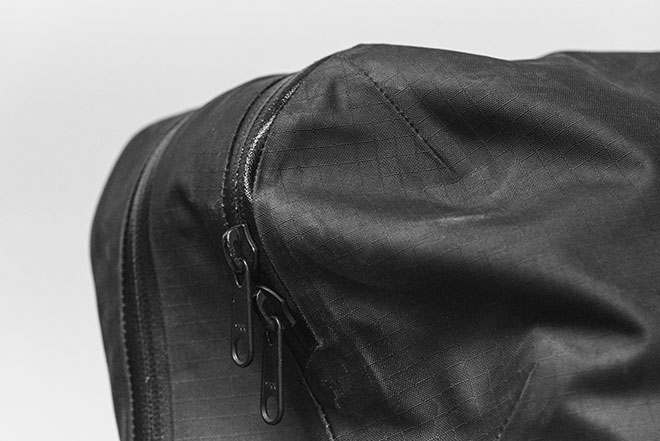
Nothing is Perfect
No product is ever finished, and the Nomin is no different. After trying really hard to find flaws and things I’d change, here’s what I’ve come up with.
The bag struggles with square things that aren’t laptops or magazines. Cameras don’t work especially well. The front compartment’s shape is not as useful as it could be for boxy, bulky items, but that’s a trade-off for the bag’s unique, low-profile silhouette. It’s less of a flaw and more just something to consider depending on your needs. I wouldn’t mind it being squared off ever so slightly.
The front compartment zipper only goes to the bottom of the bag on one side, preventing the front panel being flipped down. I’d prefer to see a full-length zip here, to make access easier and maybe for using the front compartment as dedicated shoe storage. I’d also like to see rubber-coated or fabric zipper pulls—maybe ITW GT Zip Lines or something like that. If you’re going to be a backpack ninja, you don’t want jangly zipper pulls.
While the floating flip-out pocket is cool, I’d be interested in seeing how Veilance might approach more traditional organizational elements in the front compartment. A flip-out admin panel would be pretty tech here.
Finally, one last not-exactly-a-criticism note. I learned early on that the Nomin doesn’t deal well with being overfilled. It’s built like an incredibly elegant tank, so there’s no stretch to the fabric at all. As soon as you put too much crap in there, organization breaks down.
Buy this if
– You’re an affluent professional who likes streetwear but wants a unique, high-end bag
– You’re an outdoorsy minimalist with a high-powered job, so you need your only bag to transition effortlessly to business settings
– You’re a trust fund health goth, your Spotify is full of The Haxan Cloak, and you’re trying to forget all the expensive heritage craft stuff you bought last year
Don’t buy this if
– You have your priorities in life straight
Conclusions
There is no value proposition to the Nomin’s durability. If you can afford it, you can afford to replace it. However, it is a tough, beautiful bag that should stand up to anything you can throw at it. It’s comfortable, unique, nails the details, and looks sharp. In my opinion Veilance is pushing the envelope with the Nomin’s design, and I’m glad packs as nice as this exist.





 Carry Awards
Carry Awards Insights
Insights Liking
Liking Projects
Projects Interviews
Interviews
